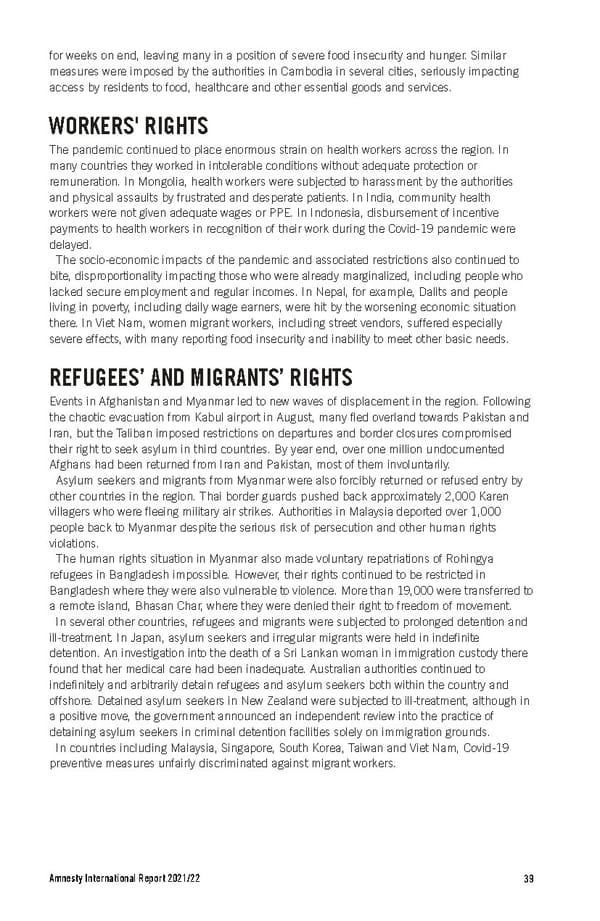for weeks on end, leaving many in a position of severe food insecurity and hunger. Similar measures were imposed by the authorities in Cambodia in several cities, seriously impacting access by residents to food, healthcare and other essential goods and services. WORKERS' RIGHTS The pandemic continued to place enormous strain on health workers across the region. In many countries they worked in intolerable conditions without adequate protection or remuneration. In Mongolia, health workers were subjected to harassment by the authorities and physical assaults by frustrated and desperate patients. In India, community health workers were not given adequate wages or PPE. In Indonesia, disbursement of incentive payments to health workers in recognition of their work during the Covid-19 pandemic were delayed. The socio-economic impacts of the pandemic and associated restrictions also continued to bite, disproportionality impacting those who were already marginalized, including people who lacked secure employment and regular incomes. In Nepal, for example, Dalits and people living in poverty, including daily wage earners, were hit by the worsening economic situation there. In Viet Nam, women migrant workers, including street vendors, suffered especially severe effects, with many reporting food insecurity and inability to meet other basic needs. REFUGEES’ AND MIGRANTS’ RIGHTS Events in Afghanistan and Myanmar led to new waves of displacement in the region. Following the chaotic evacuation from Kabul airport in August, many fled overland towards Pakistan and Iran, but the Taliban imposed restrictions on departures and border closures compromised their right to seek asylum in third countries. By year end, over one million undocumented Afghans had been returned from Iran and Pakistan, most of them involuntarily. Asylum seekers and migrants from Myanmar were also forcibly returned or refused entry by other countries in the region. Thai border guards pushed back approximately 2,000 Karen villagers who were fleeing military air strikes. Authorities in Malaysia deported over 1,000 people back to Myanmar despite the serious risk of persecution and other human rights violations. The human rights situation in Myanmar also made voluntary repatriations of Rohingya refugees in Bangladesh impossible. However, their rights continued to be restricted in Bangladesh where they were also vulnerable to violence. More than 19,000 were transferred to a remote island, Bhasan Char, where they were denied their right to freedom of movement. In several other countries, refugees and migrants were subjected to prolonged detention and ill-treatment. In Japan, asylum seekers and irregular migrants were held in indefinite detention. An investigation into the death of a Sri Lankan woman in immigration custody there found that her medical care had been inadequate. Australian authorities continued to indefinitely and arbitrarily detain refugees and asylum seekers both within the country and offshore. Detained asylum seekers in New Zealand were subjected to ill-treatment, although in a positive move, the government announced an independent review into the practice of detaining asylum seekers in criminal detention facilities solely on immigration grounds. In countries including Malaysia, Singapore, South Korea, Taiwan and Viet Nam, Covid-19 preventive measures unfairly discriminated against migrant workers. Amnesty International Report 2021/22 39
 Amnesty International Report 2021/22 Page 38 Page 40
Amnesty International Report 2021/22 Page 38 Page 40